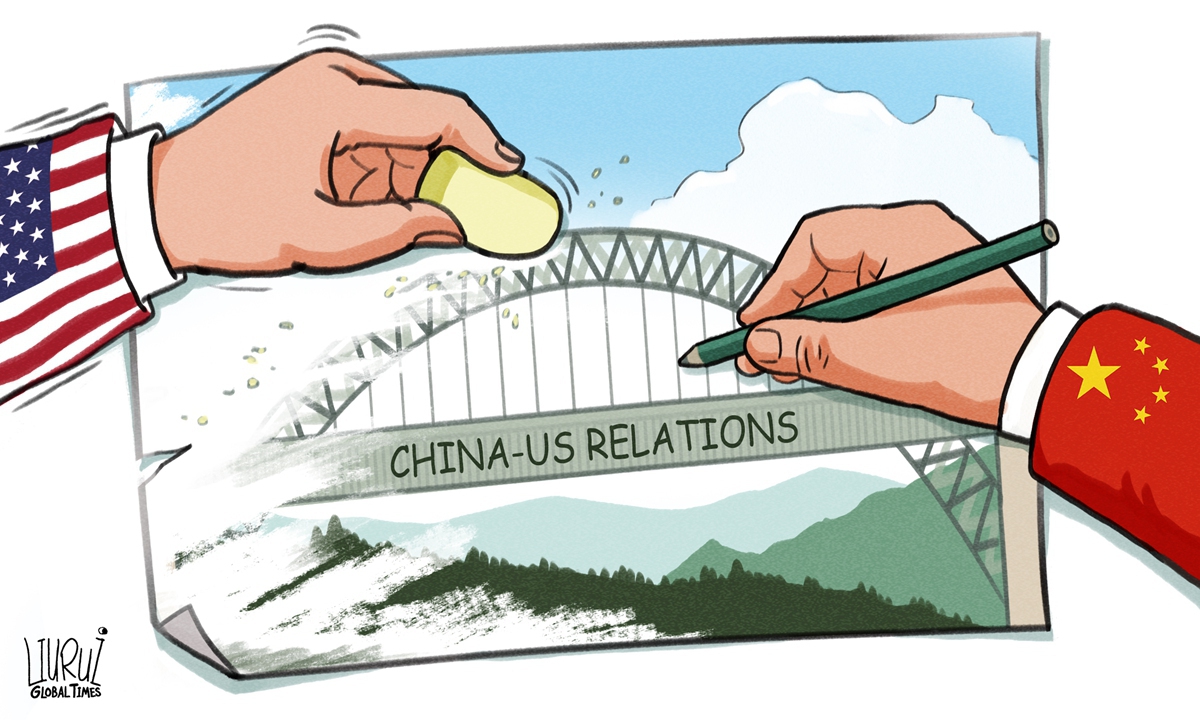US can't shirk blame for hindering people-to-people exchanges with China: Global Times editorial

Illustration: Liu Rui/GT
Chinese students studying in the US have been subjected to unwarranted harassment, interrogation, and deportation by American authorities. These incidents have been continuously exposed by both Chinese and foreign media, causing growing international concern. Recently, two high-ranking officials from the US diplomatic system responded to these issues, but their statements seem contradictory. In an interview, US Ambassador to China, Nicholas Burns, denied the allegations, stating that the US issued some 105,000 new student visas to Chinese citizens in 2023, and "more than 99 percent of student visa holders clear immigration without incident." However, US Deputy Secretary of State Kurt Campbell publicly acknowledged on Monday that US universities are limiting Chinese students' access to sensitive technology given security concerns. He also expressed a hope to see more Chinese students coming to the US to study humanities and social sciences, not particle physics.
Who should the outside world believe, Burns or Campbell? They should choose to believe the facts. When Chinese students enter the US, they are detained for interrogation in "small black rooms," have their computers confiscated, and their phones searched, leaving them "feeling like lambs waiting to be slaughtered." While studying in the US, they face discriminatory treatment, surveillance, scrutiny, and even prosecution. These incidents have not only been exposed by Chinese sources but also reported by foreign media outlets such as The Guardian, AFP, and The Washington Post. Reuters has quoted some perspectives from Western academia and civil society, stating that "deteriorating US-China relations and concerns about theft of US expertise, have derailed scientific cooperation and subjected Chinese students to unwarranted suspicion."
Burns listed a bunch of data to illustrate that the US Embassy and immigration authorities are treating Chinese students "without incident," while allowing for the possibility of the occasional mistake by US officials. He even claimed that Beijing has made it harder for Chinese students to attend US universities. However, his statement is even not supported by the US government's "mouthpiece" VOA Chinese. This media outlet, citing an American scholar, reported that US Customs has more investigative authority and experience compared to Burns' State Department system and might discover things overlooked by the State Department. In reality, some of these so-called "overlooked things" are extremely absurd, such as a Chinese student being suspected of "collusion with the Wagner Group" simply because of discussing the Ukraine crisis on social media. A larger portion of the cases, however, are "black box operations," where students have no idea why they are being investigated or why they are being deported.
The so-called "small black room" was originally a reception room for the US Customs and Border Protection, but it has now transformed into an interrogation room where the US security intelligence agencies and government officials discriminate against and harass people from other countries entering the US, becoming a concrete symbol of US protectionism. Many international students from developing countries, including Indian students, have had experiences of being harassed in the "small black room," with Chinese students being particularly targeted. When people talk of the "small black room," they think of an unfriendly America, creating a "chilling effect." Not to mention that the "little black room" is just the first hurdle that international students have to fear. As recognized by media outlets such as The Washington Post, there are also gun crimes, anti-China sentiments, work visas, hate crimes against Asians, and many other challenges waiting ahead. According to relevant data, the number of Chinese students studying in the US decreased by 83,000 between 2018 and 2023, representing a decline of over 22 percent. A survey published in the Proceedings of the National Academy of Sciences last year also showed that 72 percent of Chinese-American scientists in the US "do not feel safe," and 42 percent are fearful of conducting research in the US. In light of this, what explanations does the US have for these issues and what solutions is it prepared to offer?
Chinese students studying in the US are facing harassment, and this is not simply a discrimination issue. Some individuals in the US have never buttoned up the "first button" of strategic cognition issues, seeing China as an opponent rather than a partner and viewing the US-China relationship as a risk rather than an opportunity, which has led to contradictory actions, such as claiming to welcome Chinese students while simultaneously erecting barriers at every turn, and absurd remarks, such as "hoping to see more Chinese students coming to the US to study humanities and social sciences, not particle physics." The US treats China as an "imaginary enemy," and its intention for great-power competition is so obvious. In the eyes of the outside world, even the explanations provided by Burns are more about seizing the high ground of public opinion than sincerely solving practical problems.
Promoting people-to-people exchanges between China and the US is an important consensus reached at the San Francisco meeting between the leaders of the two countries. Through these exchanges, the two countries can enhance their understanding of each other and deepen their connections, which is beneficial for both China and the US. There is an urgent need for this among the people of both countries. Politicizing study abroad programs and research collaborations has a huge detrimental impact on people-to-people exchanges between China and the US. How the image of the US is perceived by the Chinese and people around the world fundamentally depends on the US' actions. Hindering and disrupting people-to-people exchanges will harm US reputation internationally.


